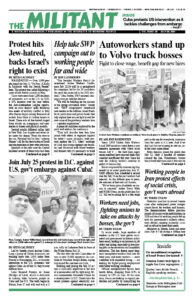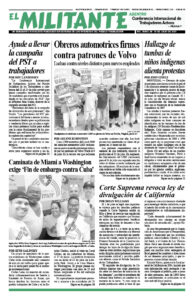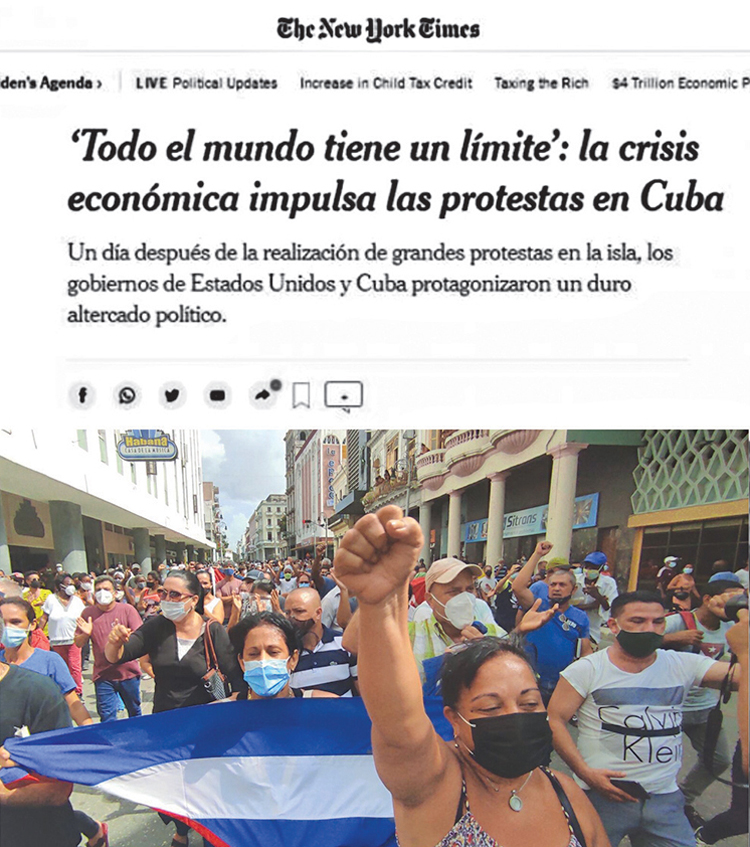If you follow the New York Times, the Wall Street Journal, Fox News, or virtually any of the U.S. capitalist media, you saw front-page reports that Cuba was convulsed July 11 by a massive, spontaneous anti-government “uprising.” That the Cuban government has “mismanaged” the COVID-19 pandemic. And that police and thugs unleashed unprovoked attacks on peaceful demonstrators.
But these are gross exaggerations and outright lies. It’s true there were marches — some involving hundreds of people — in more than a dozen cities, including Havana, far from an “uprising.” And their composition was mixed, as Cuban leaders publicly explained.
President Miguel Díaz-Canel addressed the Cuban people in a public speech later that day. He said the revolutionary government has been open about the challenges they face. “In the middle of 2019,” he said, “we had to explain that we were heading toward a difficult conjuncture” as a result of Washington’s intensification of its punishing embargo, “whose objective is to asphyxiate the economy of our country.”
There has been a shortage of food, the worst since the Special Period in the early 1990s after the implosion of the Soviet Union, formerly Cuba’s main trading partner; a worldwide downturn in capitalist production and trade that affected Cuba; and a stubborn COVID pandemic with a recent uptick in cases in Cuba.
For lack of supplies and equipment, Cuban workers and farmers have faced a recent series of electrical blackouts and other shortages.
President Joseph Biden has continued the embargo, like every president since 1960 has. The suffering imposed on the Cuban people is a direct result of U.S. government policy, which seeks to use economic pressure to bring Cuba’s socialist revolution down. Biden hailed the protests in Cuba.
Díaz-Canel explained in his address that among those who joined the anti-government actions were people “who are experiencing some of these scarcities; it includes revolutionary people who are confused or who don’t have answers or who are also expressing discontent.”
But “in the leadership” of the protests “was a nucleus of manipulators” who collaborate with U.S. anti-Cuba campaigns, he said, and they had been preparing for disruption for days.
As part of the provocation, opponents of the revolution vandalized stores that sell products in dollars, overturned a police car, and chanted slogans calling for U.S. “humanitarian” intervention or “We want vaccines.” The chant around vaccines was particularly insulting to many Cubans, given the fact that Cuba is the only country in Latin America to develop its own vaccines, rated as over 90% effective, and has begun massive distribution. However, as a result of the embargo, they have a critical shortage of hypodermic needles for vaccination.
Groups in the U.S. and worldwide have been raising money to donate syringes. The most recent was the International Longshore and Warehouse Union, which voted to contribute $10,000 to the effort at its convention in June.
Díaz-Canel called on supporters of the revolution to go out into the streets and to take the discussion on the embargo and the efforts of the government to bring relief to every doorstep.
In response, thousands of working people and youth who support the revolution took to the streets and have continued to do so.
On July 12, in the province of Cienfuegos alone, the Central Organization of Cuban Trade Unions held 171 meetings involving nearly 3,000 workers to show their support for the revolution.
Revolution’s supporters take action
Cuba’s president went to San Antonio de los Baños in Artemisa province, where the first of the protests broke out. He joined a march in defense of the revolution there July 11 and spoke directly with working people in the streets about the challenges they face.
In Ciego de Ávila, three leaders of the Union of Young Communists, Ángel Alberto Álvarez, Elizabeth López Caballero and outgoing UJC Secretary Yulianky Godínez García headed to the anti-government action there, Juventud Rebelde reported, to engage participants in discussions.
They joined a march of defenders of the revolution that blocked the way of the counterrevolutionary action. “Despite that today they opposed the revolution, we have to reach out to them, because truly revolutionary positions have always been firm, but also humane,” Godínez said.
The next day Díaz-Canel and other government leaders held an over four-hour televised press conference where they went over in detail what the government is doing to face the challenges from shortages in importing oil, spare parts, food, fertilizer and more because of the U.S.-imposed restrictions.
The Cuban president denounced the cynicism of U.S. officials who claim they support the Cuban people and present themselves as “the big savior” while they have the country blockaded. Cuba gladly accepts all kinds of aid, Díaz-Canel said, but not aid that is aimed at violating the country’s sovereignty and interfering in its affairs.
He noted Washington claims it’s the Cuban Revolution, not the U.S. embargo, that has created the problems Cuban workers and farmers face today. He challenged Washington to prove it.
“Lift the blockade,” Díaz-Canel said, “and then we will see how we do, how this people will advance.”


